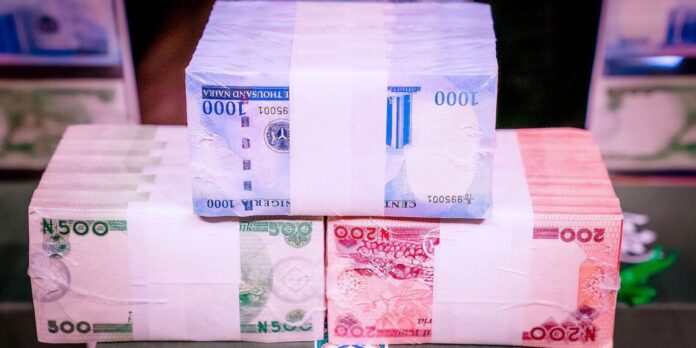The Supreme Court has again adjourned judgement on naira redesign until March 3, 2023 thwarting expectation of early end to the suffering Nigerians are going through in accessing scarce new banknotes.
The Court on Wednesday adjourned the naira redesign suit for judgement after hearing arguments of the defendants.
The suits were filed by some 10 state governments challenging the federal government’s naira redesign implementation style.
“All the suits adjourned until 3 March for judgement,” the presiding justice of a seven -member panel of the Supreme Court, John Okoro, said.
Mr Okoro adjourned the suit for judgement after his panel heard arguments for and against it on Wednesday. The proceedings lasted for over three hours.
The date of judgement is about a week after Nigeria’s presidential election which holds Saturday (25 February), and a week ahead of state elections scheduled to come up on 11 March.
The controversial monetary policy, which has led to cash crunch across the country, bringing hardship to millions of Nigerians, has been a major issue in the lead-up to Saturday’s election.
But with the postponement of the judgement on the matter till 3 March, it means there would be no judicial resolution of the monetary policy before Saturday’s election.
The suit, filed on 3 February by some state governments, seeks the reversal of the federal government’s naira redesign policy.
The policy, announced late last year by the Central Bank of Nigeria (CBN) with the approval of President Muhammadu Buhari, had introduced newly redesigned N200, N500, and N1,000 notes. It sought to end the use of the old versions by 10 February.
On 8 February, two days before the deadline, a seven-member panel of the court granted an interim order suspending the deadline set for the ending of the validity of the old banknotes.
The court also ordered that the old N200, N500, and N1000 banknotes should continue to circulate alongside their newly redesigned versions pending further hearing in the case.
The court also ordered that the old N200, N500, and N1000 banknotes should circulate alongside their newly redesigned versions pending further hearing in the case.
But in direct affront to the Supreme Court, Mr Buhari, on 16 February, directed in a national broadcast that only the old N200 notes would remain valid, while the old N500 and N1,000 currency notes had ceased to be legal tender.
The number of plaintiffs rose to 16 after six new states were added to them at Wednesday’s proceedings.
The suit was originally filed by Kaduna, Kogi and Zamfara states on 3 February to challenge the 10 February deadline set to end the validity of the old N200, N500, and N1,000 banknotes.
The plaintiffs’ number, however, rose to 10, with seven joining them at the previous sitting on 15 February.
The 16 states now on the list of plaintiffs include: the original plaintiffs – Kaduna, Kogi, Zamfara – and the seven that were joined on 15 February – Cross River, Sokoto, Lagos, Ogun, Katsina, Ondo, and Ekiti states.
The rest are the six others that were joined on Wednesday – Nasarawa, Niger, Kano, Jigawa, Rivers and Abia states.
Rivers and Abia states had filed separate suits that were consolidated with the main one.
The opponents of the suit are the Attorney-General of the Federation, Abubakar Malami, representing the federal government alongside two other states that were joined as co-defendants, based on their requests, on 15February.
The two states are Edo and Bayelsa.
The plaintiffs, through their respective lawyers, toed the same lines of argument, urging the Supreme Court to grant their prayers on Wednesday.
In its argument against the federal government, the Kano State government, represented by Musa Sanusi, urged the Supreme Court to reverse the monetary policy.
Mr Sanusi, a Senior Advocate of Nigeria (SAN), told the court that “There are security reports that if the naira redesign policy is not reversed, there might be breakdown of law and order due to the hardship it has brought on the citizens.”
The Attorney-General of Lagos State, Moyosore Onigbanjo, a SAN, and Kaduna State’s lawyer, Abdulahakeem Mustapha, also a SAN, argued that Mr Buhari, by his 16 February broadcast, and the CBN governor, Godwin Emefiele, had violated the court’s order.
But the federal government’s lawyer, Kanu Agabi, a SAN, said “the president only intervened in the (currency) crisis by asking Nigerians to deposit the old naira notes with the CBN.”
Mr Agabi, an erstwhile Attorney-General of the Federation, argued that Nigerians were already rejecting the N200, N500 and N1,000 old notes before Mr Buhari’s made his 16 February nationwide broadcast, directing the CBN to recirculate the old N200 notes.
The defence lawyer contended that it was not true that Mr Buhari was in contempt of the court.
After listening to all the lawyers to the parties in the case, the court adjourned the suit until 3 March for judgement.




